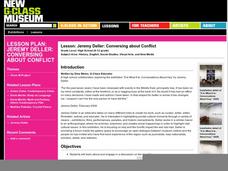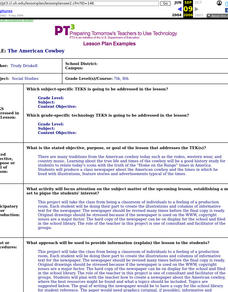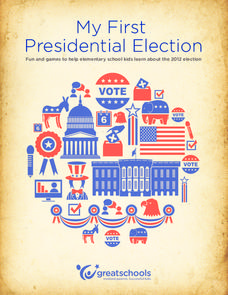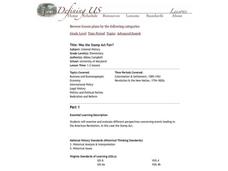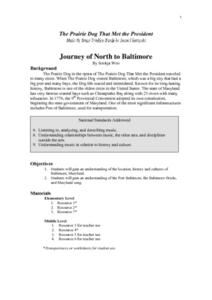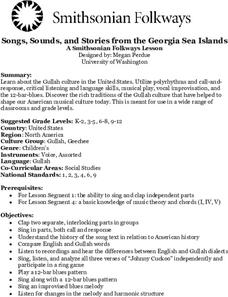Curated OER
Invetories Slave owner or not?
Primary source analysis is a great way to bring history to life. Learners examine a series of personal inventories taken from Southern white males who died during the Civil War era. They analyze the documents to determine the social and...
Foreign Policy Research Institute
Teaching the 9/11 Anniversary
Here is a lesson on terrorism and 9/11. While outdated, it could be easily revised for today's teens. It includes targeted vocabulary, a background information activity, critical thinking questions, and step-by-step procedures for...
Overcoming Obstacles
Identifying Options
"What should I do?" "How should I do it?" Middle Schoolers learn that answering these two questions is the key to solving problems. They begin with the first two steps of the Decision Making Process (gathering information and identifying...
Curated OER
Lesson: Jeremy Deller: Conversing about Conflict
Bridge cultural awareness, community, government, and art with an introspective and thought-provoking lesson. Upper graders become globally and socially aware as they analyze and explore the art of Jeremy Deller. They consider his images...
Overcoming Obstacles
Taking Tests
In a lesson designed to prepare scholars for taking tests, they begin with a review of how to plan and review notes. They Identify ways to prepare for upcoming tests and strategies for studying and memorizing information. Class members...
Curated OER
The American Cowboy
Middle Schoolers produce a class newspaper about the American cowboy and the times in which he lived with illustrations, feature stories and advertisements typical of the times. This is an ambitious, yet worthwhile project for youngsters...
Great Schools
My First Presidential Election
Register, establish a platform, make campaign speeches, and design campaign advertisements with a study of presidential elections. Young citizens engage in various activities that mimic the election process.
Curated OER
Theology…the Use of Silence in the Classroom
Immerse your class in the Middle Ages with a thorough history lesson. After viewing examples of illuminated manuscripts such as the Book of Kells, they discuss how these were the mode of keeping and storing information employed by the...
Anti-Defamation League
Martin Luther King, Jr. and Civil Rights
How far have we come and how far do we still need to go to achieve equality and full civil rights in the United States? Include a packet of materials collected in your observance of Martin Luther King, Jr. Day.
Library of Virginia
Death or Liberty
What would you do to protect your own freedom? How far would you go to protest injustice? Class members are asked to consider these questions as they read primary source documents that detail events in the lives of Gabriel, Nat Turner,...
John F. Kennedy Presidential Library & Museum
Military Advisers in Vietnam: 1963
How did the beginning of the Vietnam War factor into the Cold War with the Soviet Union? As part of a study of American involvement in Vietnam, class members read a letter address to President Kennedy and his response in which he...
Curated OER
Was the Stamp Act Fair?
Elementary and middle schoolers examine and evaluate different perspectives concerning events leading to the American Revolution. In this case, they hone in on the Stamp Act. They research controversial bills, laws, or events of the time...
iCivics
Conflict & Cooperation
Considering such conflicts as the Vietnam War and the war in Afghanistan, what motivates nations to cooperate? Your class members will analyze past and current international events in order to understand the types of conditions and...
Curated OER
Why is the Middle East so Stereotyped in the West?
Students examine the stereotypes used to classify the Middle East. After taking a regional literacy survey, they discover their own global awareness. They discuss how stereotypes are formed and how they persist over time if not stopped.
Curated OER
Social Studies: Maryland and Its Culture
Students discuss the history and culture of Baltimore, Maryland. they discover the importance of the city's port along with the state bird and song. Background sources include "The Prairie Dog That Met the President" and "Journey of...
Smithsonian Institution
Students’ Response to 9/11—A Documentary Report
Young historians research the devastating attacks of 9/11 and use that information to script their own documentaries. The follow-up activity includes recording the documentary and conducting classmate interviews,
US Holocaust Museum
Time Capsule in a Milk Can
Imagine dumping out a milk can and finding letters from one of the darkest moments in history! Scholars use Holocaust Reading Passages and research to discover how people recorded and hid history during the events of World War II. They...
University of Chicago
What IS the Difference Between Sunni and Shi'ite Muslims?
The distinction between Shiite and Sunni Muslims is an often misunderstood concept, yet very important for its implications in global affairs and for a more comprehensive understanding of the religion of Islam.
University of Chicago
Using Artifacts for Clues About Identity
Learn about the ancient Near East through a close examination of ancient artifacts. Lead your class into analysis by first observing an artifact as a class. Pupils can then work in pairs to analyze the other artifacts and compile a list...
State Bar of Texas
McCullough v. Maryland
Can a state government tax the federal government? The Supreme Court case McCullough v. Maryland explores different governments in the United States. Scholars research the court's decision with a video and discussion. They formulate...
Smithsonian Institution
Songs, Sounds and Stories from the Georgia Sea Islands
American music is the result of the influence of many cultures, including the traditions brought by the African slaves. Young scholars study the polyrhythms, the call-and-response format, and the vocal improvisations of the Gullah...
US Institute of Peace
Responding to Conflict: Nonverbal Communication
What does your posture say about you? How can it affect the outcome of conflict resolution or negotiation? Show scholars the importance of nonverbal communication during the sixth in a series of 15 peacebuilding lessons. Learners work...
Teaching Tolerance
Why Local Elections Matter
Uncle Sam wants everyone to vote in local elections! Geared toward middle and high school scholars, the resource explores voter turnout and the importance of local elections. Academics participate in group discussion, complete...
Curated OER
Message in the Waves :Two Earth Day Lessons for Middle School Students
Fifth graders are introduced to Earth day and study the nesting colonies of Midway. For this Earth Day lesson students watch an online clip and see the effects our waste has on wildlife.





